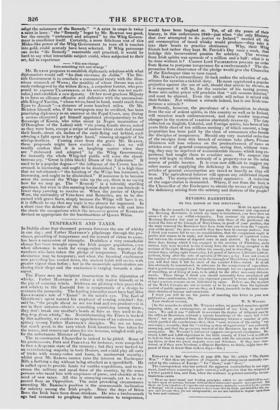TEMPERANCE AND TAXES.
IN Dublin alone four thousand persons forswore the use of whisky in one day ; and Father MATTHEW'S pilgrimage through the pro- vinces, preaching of temperance and the reward of virtue to come, has been a succession of triumphs. Doubtless a very remarkable change has been wrought upon the Irish pauper population, even when allowance is made for exaggeration in the reports of the numbers who have taken the pledge of temperance. Perhaps the abstinence may be temporary, and when the limatical excitement now prevailing has cooled down, the ancient habit will revive with greater vhfour than before ; but in the meanwhile spirit-dealers are closing their shops and the exciseman is verging towards a sine- curist.
The Times sees an incipient insurrection in the abjuration of whisky. Father MATTHEW is either a wile traitor himself; or in the pay of cunning rebels. Irishmen are plotting when peaceable, and sobriety in the Emerald Isle is symptomatic of a design to overturn the monarchy. The leading journalist must have had Miss Eneswotern's tale of " Ennui" in his mind's eye. The Earl of Glenthorn's agent warned his employer of coming mischief : for, said he, "the people about us are too hash and too prudent—it is not in their natures—there's something contriving among them ; they don't break one another's heads at fairs as they used to do; they keep from whisky," &c. Notwithstanding the Times is backed by this authority, we confess no apprehensions of an extensive con- spiracy. among Father Manitsw's disciples. We see no harm, but much good, in the turn which Irish fanaticism has taken for the nonce, and reserve our alarm for the revenue, mingled with pity for the unfortunate Minister of Finance.
The reconstructed Chancellor is indeed to be pitied. Some of his predecessors, PITT and PERCEVAL for instance, were compelled to time a desperate state of the treasury ; but they were backed by an overwhelming majority in both Ilouses, and could play all sorts of tricks with money-votes and loans, in unobserved security ; whilst poor Mr. BARING cannot raise the interest on Exchequer Bills a farthing a day without being attacked as a spendthrift. Ile is called upon to provide funds far warlike expeditions, and to in- crease the military and naval force of' the country, by the same persons who taunt him with emptiness of purse, and chuckle at his need of new taxes. All this is annoying enough, yet to be ex- pected from an Opposition. The most provoking circumstance attending Mr. BARING'S position is the unseasonable inclination for sobriety among the Irish people. Since the days of Brien Boru the Irish have been dram-drinkers. Ile who a twelvemonth ago had ventured to prophesy their conversion to temperance, would have been laughed at. Yet, of' all the years of their history, in this unfortunate 1840—just when "the only Ministry that ever attempted to do justice to Ireland" needed all the aid consumption of taxed whisky would produce—they take it into their heads to practice abstinence, Why, their Whig friends had rather they kept St. Patrick's Day once a week, than indulge this inconvenient passion for sobriety. The revenue from Irish spirits was upwards of a million and a half: what is to be done without it ? Cannot Lord PALMERSTON procure an order from Rome to postpone temperance for a twelvemonth ? The dis- pensation from observance of the pledge would give the Chancellor of the Exchequer time to turn round.
Mr. BARING'S extraordinary ill-luck makes the selection of sub- stitutes for taxation a ticklish duty. He must apprehend a popular prejudice against the use of salt, should that article be chosen, as it is supposed it will be, for the exercise of his taxing powers. Some anti-saline priest will proclaim that " salt seasons dainties," and must be abjured. Even the cattle will refuse it mixed with their fodder. Not without a miracle indeed, but is not Irish tem- perance a miracle ?
Seriously, however, the prevalence of a disposition to abstain from the use of ardent spirits, in this country as well as in Ireland, will occasion much embarrassment, and may render important changes in the system of taxation absolutely neeesssry. The duty collected on English, Colonial, and Foreign spirits, has been of late years little short of ten millions sterling ; of which amount, a large proportion has been paid by the class of consumers who furnish the disciples of temperance. Should any very material reduction of the receipts from this branch of revenue take place, Finance Ministers will lose reliance on the productiveness of taxes on articles even of general consumption, seeing that, without warn- ing, they may be deprived of a considerable income which long ex- perience had taught them to consider sure. We suspect that many will begin to think seriously of a property-tax as the safest source of public income. It is even now difficult to suggest any other means of supplying the deficiency in the revenue. Most articles of general consumption are taxed as heavily as they will bear. The agricultural interest will oppose any additional impost
on malt. The stamp-duties are already oppressive. A reduction of the sugar-duties is demanded. Where, if' not from the land, is the Chancellor of the Exchequer to obtain the means of supplying the deficiency arising from the sobriety and distress of the people?


























 Previous page
Previous page